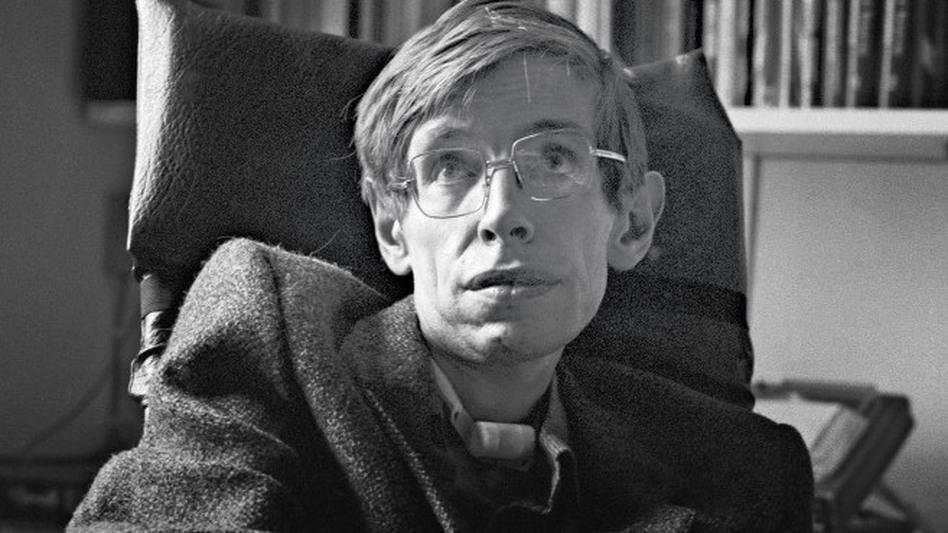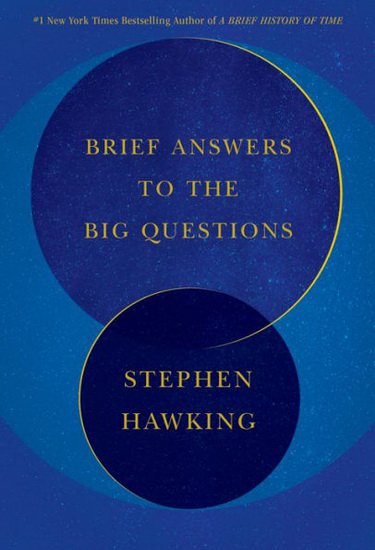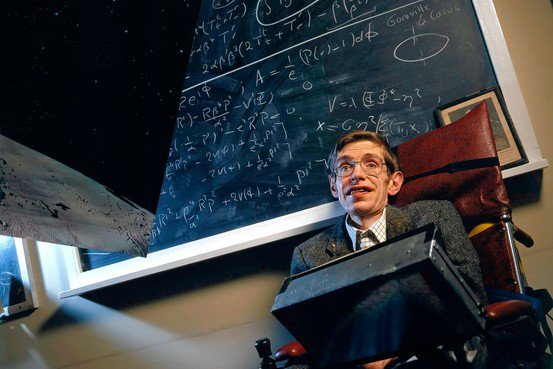
“So remember to look up at the stars and not down at your feet. Try to make sense of what you see and wonder about what makes the universe exist. Be curious. And however difficult life may seem, there is always something you can do and succeed at. It matters that you don’t just give up. Unleash your imagination. Shape the future.”
Recently I was reading the last book published from the late Stephen Hawking entitled: Brief Answers to the Big Questions. In this post I want to contend with some issues Stephen Hawking raised concerning God in His book and see if they live up to scrutiny.
Now before we start one might say:
However, degrees behind someone’s name does not make that person right. Nor lack of degrees makes one wrong. As the Philosopher of Mind, J. P. Moreland points out:
As the Epistemologist and Philosopher of Science Dr. Timothy McGrew once said:
Show me that you know what you are talking about, and I don’t care whether you have the degree.
Show me that you don’t know what you are talking about, and I don’t care whether you have the degree.”2
So I think that we should avoid commiting an appeal to authority fallacy and a genetic fallacy.
Moreover Stephen Hawking when speaking about God is talking as a mere layman even if he is an expert in Physics. As Sir Martin Rees has said:
Of course this doesn’t show us his views are wrong. Even if he studied little on this he could still be right. So we need to examine the evidence.

In the Book, Hawking gives his view of the beginning of the Universe and why we don’t need a God and I think it’s there we should start.
Hawking starts off his book with a few claims against Religion:
•Science is better and gives more consistent answers.
•People forever will cling to religion due to comfort as they don’t trust in or understand Science.
Let’s address these in turn briefly.
Is it true that Science gives better and more consistent answers than religion? I don’t think that’s the case at all.
Science cannot in principle address the origins of the Universe (that is all of spacetime, matter, and energy), namely for 3 reasons:
•Science gives explanations for some feature of the universe via another feature of the universe and often connecting them under a physical law.
For example often people will appeal to certain catastrophic events that caused the Ice Age or extinction of the Dinosaurs or of a certain physical, biological and chemical cause for the Evolution and development of various species in the course of history.
So the Universe must exist before we can give any Scientific explanation of anything. Science presupposes the Universe. The Universe has to exist before we give any Scientific explanation of anything or there would be nothing to which things like laws and initial conditions can even apply.
•Scientific explanations involving causes happen via event-event causation in which a prior event causes a latter event. For example an electron bumps into another electron or the wind knocks an apple off a tree. Here we have a prior event causing a later event. However there was no time prior to time therefore a prior cause could not have caused the dynamic beginning of the Universe.26
So suppose for example that the cause of waters freezing was that the temperature was below 0°C. Now suppose this is in an eternal timeless state. Then the water should be frozen for eternity past it could not have done so only a short time ago. That’s because the sufficient condition (the temperature) is in an timeless state and since it is sufficient to produce its effect, the effect (water freezing) too must be in such a state. It could not have just began to exist.
Similarly a scientific condition sufficient to produce the Universe could not have produced it 13.8 billion yrs ago.
•Coming into existence is an instantaneous event not a process. It’s not as though the thing that began to exist were only 5% real which is an incoherent notion. It’s either real or not real by the law of excluded middle. Science however deals with transitions and processes hence is inadequate to explain the origin of the Universe. It doesn’t transition from non-being say into being.4
Thus Science is not better than Religion in many respects. Since on for example the Christian view God is a Maximally Great Being and thus a Necessary Being with Libertarian Free Will (LFW), He can both have an explanation for His existence in the Necessity of His own nature, have the properties necessary to cause the Universe (like Omnipotence, Omniscience, and so forth) and since He has LFW can avoid the issues of event-event causation in that in Libertarianism one can freely and spontaneously bring about a new effect without prior determining conditions.5
How about the claim that people hold to religion out of comfort and due to not understanding Science.
This seems to assume that if you understand Science then you would not believe in God. Far from the truth many if not most Noble Laureate’s believed in God and many Scientists today are Christian’s. 6
Indeed Christianity greatly influened the Scientific Revolution and modern Science.7

How about the remark on comfort? This seems question begging and thus a fallacy. If Christianity is true then God would have designed our faculties and if He designed it to aim at truth then it wouldn’t be a suprise then that we would find ourselves inclined to believe in God.27
Indeed Dr. Andrew Moon has given 2 arguments for such a view as follows:
1**) If religion X is true, then God intended for the cognitive faculties of theists who have a doxastically valuable relationship to form true, theistic beliefs.
(2*) If God intended for the cognitive faculties of theists who have a “doxastically valuable relationship” to form true, theistic beliefs, then belief in God is probably produced in such persons by cognitive faculties functioning properly according to a design plan successfully aimed at truth in the environment for which those faculties were designed.
3**) If religion X is true, then such theists’ belief in God is probably warranted.
Secondly:
2*) If God intended for the cognitive faculties of theists who have a “doxastically valuable relationship” to form the true, theistic beliefs, then belief in God is probably produced in such persons by cognitive faculties functioning properly according to a design plan successfully aimed at truth in the environment for which those faculties were designed.
And from Plantinga’s theory of warrant, it follows that
3***) If God intended for the cognitive faculties of theists who have a “doxastically valuable relationship” to form the true theistic beliefs, then such theists’ belief in God is probably warranted.8
Even more the paradigm view in Cognitive Science is that belief in God is natural.
As Justin L. Barrett points out concerning Cognitive Science of Religion (CSR): “CSR provides evidence that humans have natural propensities toward believing in some kind of god. A rudimentary sense of the divine, called a sensus divinitatis in Calvinist theology, appears to be not only natural but early developing.”9
Kelly James Clark actually shows that Atheism is not normal. He also shows that Atheists and Agnostics tend to be in the high Autism spectrum and lower if one is a religious believer. Now none of this shows if a view is true or false via beliefs.
Nor can it show if a particular person is say autistic just based on statistics even if the quotient is high. However it does show that Religious belief is quite natural particularly towards an Atheistic view like Hawking’s.
Thus Hawking’s statement on Religious believers holding to belief in God based on comfort just doesn’t follow.10
Even more many beliefs about God aren’t comfortable such as the idea that you would be accountable to such a being, say on judgment day. Or the idea that you or others may be found guilty before such a Being and Hell be your lot or of someone whom you know. Indeed some Atheists have said they do not want a God and fear religion. As Thomas Nagel stated:
Thus many may hold to Christianity not because it is comfortable but because it’s true and they believe it to be such.
Hawking then goes on to say that everything can be explained by the laws of nature, including it determining the Universe to originate and since these are fixed and unchangeable they cannot be broken.
This provides he thinks a contradiction between Science and Religion as there is then no need for God as God cannot intervene or else the laws would be broken. And the intial conditions of the Universe may be due to laws. Thus no need for a God to Decree the Universe to be.

In arguing that we don’t need God for the Universe to originate he gives a way it might have originated without God.
He thinks that the laws of nature demand things like negative energy (the laws he says are universal). So that it’s a law of nature that negative and positive energy came to be by the Big Bang. These energies which come from space cancel each other out and thus amount to zero so that nothing created the Universe and it came about spontaneously. Hence no need for God.
Moreover since there is no time before the Big Bang there could not have been a time for the cause of the Universe to exist in. Hence the Universe did not have a cause let alone that be God. Thus the very question of God creating the Universe makes no sense.
How are we to assess such claims? Let’s start first with His claim that the Universe came to be by laws of nature and hence by nothing.
First I want to point out how incoherent such a statement is philosophically.
According to Hawking the Universe is explained by laws of nature and hence
something then he says the Universe came about by nothing.
But if sans the Universe there were laws of nature and these explain how the Universe came to be then there was indeed something namely laws of nature not nothing.12
Indeed Hawking says the Universe created itself and says the Universe was created from nothing. Which is it? Was it created by itself or by nothing? Was it self-caused or uncaused?13
Moreover the claim the Universe created itself is incoherent because you would need the Universe already in order to do so, but then it wouldn’t need to be created as it already existed.
As the Mathematician and Philosopher of Science John Lennox once said:

These two levels are:
•The Universe Created itself.
•Nothing originated the Universe yet it happened by something (laws of nature, the Universe, etc).14
Another problem with Hawking’s view is that laws of nature are what are called Abstract Objects but these by definition do not stand in causal relations hence are inept to explain the origin of the Universe.15
Indeed laws of nature are descriptive as Hawking himself admits. Thus they are not prescriptive. As Ludwig Wittgenstein says:
The descriptive view is called Regularity Theory, on this view these aren’t really laws but general descriptions of anything that happens in nature hence they cannot be broken as whatever happens will just become part of the description.
They merely describe these regularities and so anything God does cannot in principle violate it.
A second view of natural law is called Nomic Necessity. On this view these laws of nature aren’t just descriptions of regularities but it tells us or prescribes to us what can and cannot happen.
However on this view these laws are inductive generalizations and Universal generalizations based on experience hence anything which occurs that it doesn’t permit must be revised to take that into account so that it also makes room for God.
Often though the Nomic necessity view of natural law isn’t viewed in such a way as to not permit things either as it is often thought that an implicit assumption behind it is ceteris paribus (all things being equal).
Thus it is only valid on the assumption that nothing is interfering. Hence if God does intervenes in the world then no natural law is violated.
The last and final view is called the Causal Dispositions view. On this view different things have different dispositions and because of this they can affect certain things. For example fire has the disposition to burn people if touched and if it is unimpeded it will do so.17 This view thus leaves room for God as well to impede on things as he did with say Shadrach, Meshach and Abednego in the Bible when they were thrown into a fiery furnace, yet the flames did not harm them.18

How bout God putting in place and upholding the laws which Hawking denies?
If you hold to a descriptive view of natural laws then the question becomes why does the Universe run on such a description? It’s simply not answered and seems as Mary Leng has said: “a happy coincidence”.19 A massive one at that and this seems massively and cosmically coincidental and improbable.
Why think they are say instead prescriptive? That the Universe must have been? The laws of nature are not logically necessary. Hence this creates huge problems for such a view.20
Also we know that the universe itself is contingent and thus is changing. It began to exist and could contain one less atom.21
With this in mind it starts to become apparent that these laws do not demand negative energy let alone a universe in contrast to Hawking’s claims.
Hawking indeed has another issue. If laws are descriptions as he seems to say then they cannot exist without that which they describe hence it would be impossible to have them without the universe already and hence cannot be used to explain the origin of the universe.
Contra Hawking’s views then the laws of nature are inadequate to explain the universe as we’ve just seen.
How about this bit about nothing creating the universe? First nothing cannot mean literally nothing for nothing is not anything, it’s a term of universal negation.
So the terminology is misleading, as if the term is referring to a name of something or using it as a pronoun, and this is all just a misuse of the english language.22
If Hawking literally means nothing then his view becomes incoherent for nothing has no powers, no properties, not even potential and hence cannot explain anything.23
If things also can come out of nothing then it becomes inexplicable why anything and everything doesn’t do this, and all the time. Why aren’t a million dollars coming into existence for me as I speak? What makes nothing so discriminatory as to just create a universe?24
As the Philosopher William Lane Craig says:
Moreover thinking of laws and nothing as real commits the reification fallacy.

1 J.P. Moreland. Scientism and Secularism: Learning to Respond to a Dangerous Ideology (Crossway, 2018), pp. 176.
2 Dr. Timothy McGrew. (Private Correspondence). I thank Dr. McGrew for permission to quote him.
4 J.P. Moreland. Scientism and Secularism: Learning to Respond to a Dangerous Ideology (Crossway, 2018), pp. 139, 140.
6https://youtu.be/9Y2ICUYwp4E. George Ellis, Aron Wall, James M. Tour, Francis Collins and Don Page to name a few.
8 See the link to the relevant paper here as well: http://capturingchristianity.com/cc011-a-defense-of-reformed-epistemology-part-2
9 Justin L. Barrett. Cognitive Science, Religion, and Theology (Templeton press, 2011), pp. 161. One can hold to the sensu divinitatis without being a Calvinist.
10https://youtu.be/xgT8LHyKIak. I thank Dr. Tyler Dalton Mcnabb for alerting me to these things concerning Cognitive Science. For defences of these things see: Justin L. Barrett, “Evolutionary Psychology and The Argument from Positive Epistemic Status” in Two Dozen (or so) Arguments for God: The Plantinga Project (Oxford University Press, 2018).
11 Thomas Nagel. The Last Word (Oxford University Press, 1997), pp. 130-131.
12 John C. Lennox. God and Stephen Hawking: Whose Design is it Anyway? (Lion Hudson, 2011), pp. 29 (Kindle Edition).
14 John C. Lennox. God and Stephen Hawking: Whose Design is it Anyway? (Lion Hudson, 2011), pp. 30-31 (Kindle Edition).
15 William Lane Craig, God and Abstract Objects: The Coherence of Theism: Aseity (Springer, 2017). Introduction.
16 Ludwig Wittgenstein, Tractatus logico-philosophicus 6.371.
17 William Lane Craig. Reasonable Faith (3rd Edition) (Crossway, 2008), pp. 261-263.
18https://www.biblegateway.com/passage/?search=Daniel+3%3A16-28&version=KJV
19 Mary Leng. Mathematics and Reality (Oxford University Press, 2010), pp. 239.
20https://www.randyeverist.com/2015/10/god-and-laws-of-nature.html?m=1
21https://www.reasonablefaith.org/question-answer/P20/is-the-universe-a-necessary-being.
22https://www.reasonablefaith.org/media/reasonable-faith-podcast/a-universe-from-nothing/. See also Richard Dawkins getting taking in by Lawrence Krauss’ use of the word nothing: https://youtu.be/v34QjYPuiEA
24 William Lane Craig and James Sinclair. “The Kalam Cosmological Argument” in The Blackwell Companion to Natural Theology (Wiley-Blackwell, 2009), pp. 186, 187. See also: https://www.reasonablefaith.org/writings/question-answer/much-more-ado-about-nothing/
25https://www.reasonablefaith.org/media/reasonable-faith-podcast/what-is-nothing/
26https://youtu.be/DoOJKECJzKo. See also William Lane Craig. Time and Eternity: Exploring God’s Relationship to Time (Crossway, 2011).